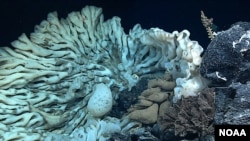Underwater researchers say they’ve found an ocean sponge the size of a minivan deep waters off the coast of Hawaii in the Papahānaumokuākea Marine National Monument.
The sponge, which researchers say is the largest ever recorded, was discovered in 2015 by the National Oceanic and Atmospheric Administration’s research vessel, the Okeanos Explorer and was recently described in the journal Marine Biodiversity.
Its size researchers say also suggests it is very, very old.
No one knows how long sponges can live, but some large ones found in shallow water are suspected to be over 2,300 years-old, and some estimates suggest they could be thousands of years older.
“The largest portion of our planet lies in deep waters, the vast majority of which has never been explored,” said Papahānaumokuākea research specialist Daniel Wagner, science lead for the expedition with NOAA’s Office of National Marine Sanctuaries. “Finding such an enormous and presumably old sponge emphasizes how much can be learned from studying deep and pristine environments such as those found in the remote Papahānaumokuākea Marine National Monument.”
Founded in 2006, the Papahānaumokuākea Marine National Monument is, according to its website, the “largest contiguous fully protected conservation area under the U.S. flag, and one of the largest marine conservation areas in the world” at over 362,073 square kilometers. It is bigger than every national park combined.
The Okeanos Explorer is the "only federally funded U.S. ship assigned to systematically explore our largely unknown ocean for the purpose of discovery and the advancement of knowledge."
Massive, and presumably old sponges provide "key ecosystem services such as filtering large amounts of seawater, as well as providing important habitat to a myriad of invertebrate and microbial species,” according to the study.
The Okeanos Explorer made another discovery recently when it spotted a “ghost-like” octopus believed to be a new species.





